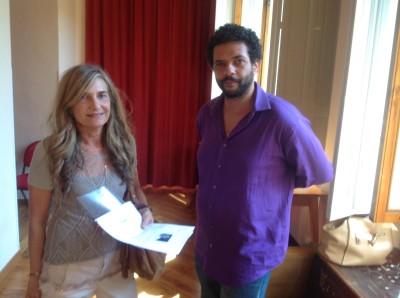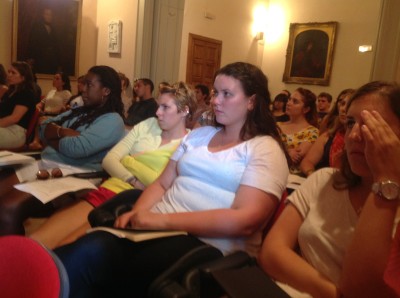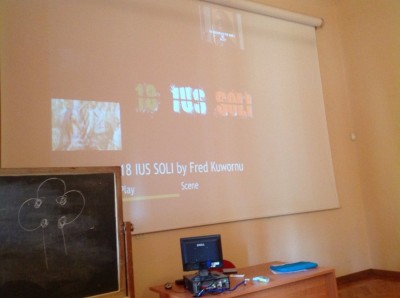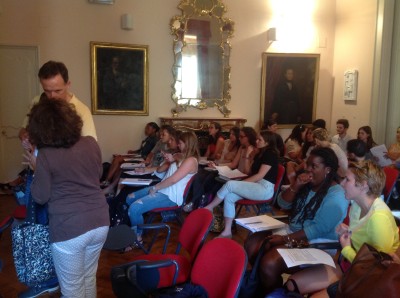On September 23, activist, producer, and director Fred Kuwornu spoke to students of Syracuse University-Florence concerning the issues of ethnicity, national identity and multiculturalism in contemporary Italy. Kuwornu addressed these topics by presenting and discussing his most recent film entitled 18 IUS SOLI. The documentary follows the lives of 18 young adults born and raised in Italy by their parents who ae originally from Africa, Asia and Latin America. While they all have grown up in Italy, go to school in Italy, and speak Italian as their primary language, they are not recognized as citizens by the Italian government. Throughout the documentary, Kuworno details the particularities of this Italian law and reveals the injustice incurred by second-generation immigrants. After his presentation, Syracuse University Florence students interviewed Kuworno; below is a section of the interview.
What prompted you to make this documentary?
“For a long time, I didn’t know anything about the issues of immigration and citizenship in Italy. When I was living in New York City, I read an article that addressed this problem of second-generation immigrants and their quest for citizenship. After conducting more research on the issue, I decided that I wanted to construct an engaging narrative that addressed this issue while also appealing to the common people of Italy. My goal was not to create a documentary for politicians and policy makers; I wanted to spread awareness to the general public and breakdown the popular stereotypes associated with second-generation immigrants.
Could you explain the significance of the title of your documentary? Each component of 18 IUS SOLI has a specific meaning. 18 designates the age in which teenagers are officially considered adults in Italy. At this age, all second-generation citizens have to acquire a visa and apply for citizenship, many times on their own. As soon as turn 18, they are regarded as foreigners in the eyes of the Italian law.
They begin to encounter many problems and start to lead remarkably different lives in comparison to their friends, who are automatically granted citizenship by the government. This age is critical to the story of second-generation immigrants and I wanted that concept to be communicated from the outset. Additionally, Ius Soli is the Italian legislation that details and defines the legal criteria for second-generation Italian citizenship. On the most basic level, Ius Soli is recognized globally as the entitlement of anyone born in a particular territory of a state to citizenship. Citizenship in the United States functions on this concept. However, the government of Italy implements a restricted version of Ius Soli in which citizenship by birthplace is not automatic for the children of immigrants. Thus with the title of my documentary, I wanted to address two of the major issues, both social and legal, concerning second-generation Italian immigrants.
Why did you choose film specifically as your medium?
I enjoy documentaries, and after seeing Made in LA ( a documentary about the problems Latino women in LA face without proper documents) I was inspired to convey my message in the same way. With many screenings and a Facebook page to gain awareness, My video is reaching many people, especially by screening My film at universities in America as well.
What do you think of the treatment of immigrants in New York vs. immigrants in Italy?
In New York, people can go wherever they want. For example, an immigrant can be raised in America, then move to Brazil and raise a family if he really wants to. In New York there is more acceptance of immigrants if you have the right paperwork. In Italy on the other hand, whether you have the correct documents or not you are still not considered Italian. To be considered Italian both your identity and citizenship must match.
How was your experience working with Spike Lee?
It was a great experience working with him on Miracle at St. Anna, which was filmed in Viareggio, also because I volunteered as a stand in (prepares the lights for the next scene while the light director is on break) so I got to participate in military training given by an American Marine, who was training actors in order for them to deliver a more authentic performance. Spike Lee gave him daily instructions directly therefore I learned a lot from him, having many opportunities to talk to him. Spike Lee always works with new people when he makes a documentary therefore he is always learning something new.
While very minimal progress has been made concerning this issue of citizenship, Kuworno is hopeful that change will occur in the near future.
Kuworno is currently working with Diversity Italia,
http://www.18-ius-soli.com/#!english/c64y
a national association founded by Kuworno that strives to engage a new diversity policy in Italy and support diversity initiatives. Kuworno also revealed that his next film project is a documentary about Afro-Italians working in Italian cinema during the 1970’s and 80’s
Watch the video of F.K. ‘s conference at SUF:
https://www.facebook.com/video.php?v=10203217834466660&set=vb.1232511570&type=2&theater#
*Studentesse SUF Fall 2014





